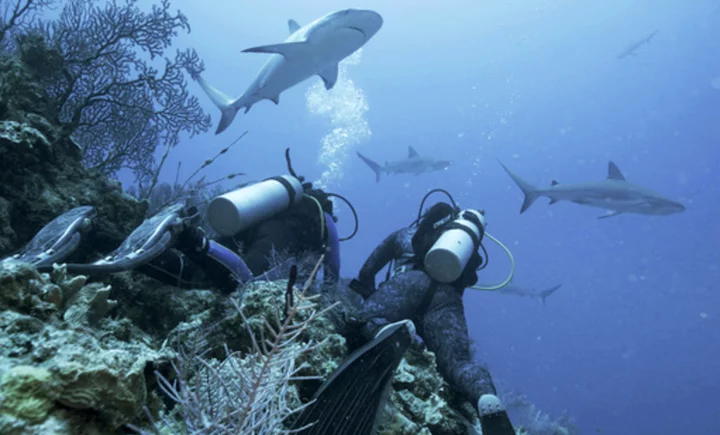NEW YORK (AP) — Discovery Channel has landed the perfect host this year for “Shark Week,” none other than a huge fan of all ocean creatures — Aquaman.
Jason Momoa, who in real life dreamed of a career as a marine biologist before Hollywood anointed him an ocean god, is going back to his roots to celebrate all things shark.
“My heart is in the ocean,” Momoa told The Associated Press from Tahiti, moments before taking a trip to swim with some of the apex predators. “Doing ‘Shark Week’ is a no brainer.”
Momoa will be the week’s recurring master of ceremonies, dipping in and out of the channel's roughly 20 new hours of programs that start Sunday. Episode encores run most nights, too.
Viewers will get to see rare sharks off the coast of South Africa, examine deadly shark attacks off the posh beaches of Egypt’s Red Sea and investigate whether sharks in Florida waters are getting high on cocaine.
The week kicks off with a sort of nautical nod to “Jackass.” Researchers in the show “Belly of the Beast: Feeding Frenzy” try to reproduce a great white shark feeding frenzy by building a life-sized dead whale carcass decoy.
They put veteran “Shark Week” biologist Dr. Austin Gallagher and cameras inside the cavity — along with 200 pounds of chum and 50 gallons of blood — and hope it can make dozens of sharks go mad. Then they try it at night.
“There are a few moments during the show where I was pretty freaked out,” Gallagher told the AP. “There’s a healthy respect there and I don’t want that ever to go away because I know what these animals are capable of.”
“Cocaine Sharks,” which premieres Wednesday, examines whether the occasional bricks of cocaine abandoned by drug smugglers effect shark behavior. ”I'm basically looking for something really weird and out of the ordinary," says the lead scientist, Tom Hird, in the program.
It shows a swarm of lemon sharks going a bit insane over floating bales of faux cocaine and later we see how fish powder mimics the dopamine response that cocaine might give to junkie sharks. “Hopefully people enjoy the show as much as they enjoy the title,” Hird said.
Geeking out with viewers will be Momoa, who watched “Shark Week” growing up and says he couldn't wait to meet the scientists behind the programs. “I’m going to be every other fan,” he said in an interview before the Hollywood strike. “This is my life’s passion.”
As always, there is a deep respect for the creatures and strong science beneath the amusing titles, dramatic music and eye-popping titles like “Great White Fight Club,” “Shark Vs. Snake” and “Serial Killer: Red Sea Feeding Frenzy.”
“Alien Sharks” tries to find obscure species like the broadnose sevengill, which dates to the Jurassic Era, but is lately prized for their livers by orcas. There's also the deliciously named puffadder shyshark, which glow under UV light, and the white-spotted wedgefish, named appropriately for its shovel like appearance.
“For me, what’s so wonderful about alien sharks and this program is the opportunity to showcase the little guy,” said biologist Forrest Galante, who can be seen smooching a few of his sharks. “I get so excited and emotional when I’m working with these unique creatures that I do impulsively stupid things like kiss a shark before I say goodbye to it.”
Many of the programs investigate changes in the beasts' behavior that may have to do with climate change or overfishing, such as sharks appearing in unfamiliar locations. Conservation efforts have also started to boost their numbers, bringing them closer to humans.
“Sharks aren’t changing their behavior to target people or to be in close proximity to human beings. Humans are changing their behavior, growing at an alarming rate, spending more and more time in the water, having a hotter and hotter climate,” said Galante. “That leads to more interactions. And some of those interactions may be negative, but of course, the press blows that way out of proportion.”
Momoa, who studied marine and wildlife biology in college, taped his segments in New Zealand while in production on his upcoming Apple TV+ series "Chief of War."
Discovery’s “Shark Week” has a rival — its programming coincides with National Geographic’s “SharkFest,” which also has has hours of sharky content over four weeks.
“Shark Week” was born as a counterpoint for those who developed a fear of sharks and a desire to eradicate them after seeing “Jaws.” It has emerged as a destination for scientists eager to protect an animal older than trees.
“'Jaws' really messed up a lot of people. They don’t get in the water for sure. But it’s just not the case,” said Momoa, who urged people to view sharks like they do in Tahiti.
“We call them the guardians. They’re just not looked upon as these things that are mean and scary that come to attack us. We live in harmony with them.”
___
Mark Kennedy is at http://twitter.com/KennedyTwits









